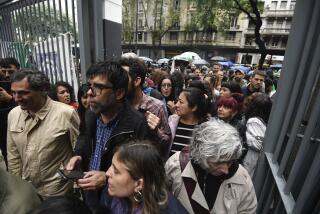Strikers Claim Success but Pinochet Is Unmoved
- Share via
SANTIAGO, Chile — A two-day strike by middle-class Chileans intent on driving President Augusto Pinochet from office ended here Thursday with organizers claiming success but with Pinochet seemingly undaunted by the show of political strength.
Traffic of buses, trucks, and taxis was markedly below normal again Thursday, but more shops seemed open than on Wednesday, the first day of the strike. Factories, offices, banks and the government functioned normally. For the second day, university students occupied their campuses--after dutifully sitting for morning semester exams.
Despite minor shirmishes Thursday between patroling police and troops, there were no more fatalities, and the death toll for the two-day action held at three. Police said 22 persons were wounded and about 200 arrested nationwide.
In keeping with its reaction to earlier protests, the Pinochet government imposed censorship on opposition radio stations and a judge studied charges against 17 strike leaders.
National security charges were also brought Thursday against the Social Democrats’ magazine Cauce, and the magazine Analisis, published by one of the Marxist branches of the Socialist Party. Radio stations and weekly magazines are Chile’s best sources of independent information.
The strike, called by a two-month-old Assembly of Civility that embraces 22 professional and labor organizations, drew wide backing from such middle class, self-employed Chileans as shopkeepers and the owner-drivers of trucks and buses, although it was unclear whether they went along out of conviction or of fear that strikers might retaliate against them if they did not. Bus burning is a trademark of Chilean protests.
The two-day work stoppage, however, won no appreciable support from businessmen or from ordinary Chilean workers.
“Even businessmen who oppose Pinochet are not going to risk jumping into the abyss,” said Fernando Leniz, a business leader and former economy minister. “In a country with high unemployment, workers fear losing their jobs.”
Leniz was an author of a plan sponsored by the Roman Catholic Church for a transition to democracy that Pinochet rejected late last year.
An inflexible army general in his 13th year of nearly absolute power, Pinochet, 70, portrays himself as the alternative to Communist-provoked chaos in Chile. He has rejected all demands that he leave office before his term expires in 1989, and he has ignored all appeals to modify a disputed constitution to let direct presidential elections take place then.
Rejected Transition Plan
Under the 1980 constitution, the armed forces and national police will name a single candidate for an eight-year term, with their choice to be ratified by plebiscite.
Pinochet gives every indication he intends to be the military candidate in 1989. Some well-placed Chilean sources, however, believe that he intends to confound his opponents at the last minute by allowing direct elections.
His reasoning, the sources say, is that if the electoral choice is Pinochet versus a candidate whose support includes the roughly 20% of Chileans who have historically voted Marxist, then Pinochet wins.
Some of Pinochet’s opponents hope that the armed forces will tire of helping the police repress their fellow citizens in defense of an unpopular government. At the same time, though, there is no evidence to suggest any weakening of the military’s commitment to Pinochet, at least through his current constitutional term.
More to Read
Sign up for Essential California
The most important California stories and recommendations in your inbox every morning.
You may occasionally receive promotional content from the Los Angeles Times.












